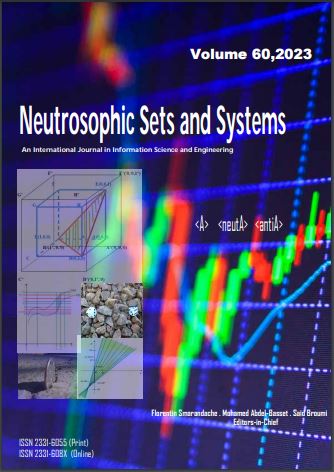On Treating Input Oriented Data Envelopment Analysis Model under Neutrosophic Environment
Keywords:
Optimization, Data Envelopment Analysis, Neutrosophic Variables, Single Valued Neutrosophic, Neutrosophic Score Function, Performance Measure, Efficiency Analysis, Decision MakingAbstract
Data Envelopment Analysis (DEA) stands out as the most commonly employed
approach for assessing the overall performance of a group of similar Decision-Making Units
(DMUs) that utilize similar resources to produce comparable outputs. Nonetheless, the observed
characteristics of symmetry or asymmetry in various types of data in real-world applications can
often be imprecise, unclear, insufficient, or contradictory. Neglecting these conditions can
potentially result in erroneous decision-making. Certain models take a more restrictive approach
by assuming that inputs and outputs possess the same level of determinism. Regrettably, such
constraints don't hold true for the majority of real-world scenarios. In actual situations, however,
the observed input and output data may sometimes be neutrosophic numbers. So, the primary
purpose of this study is to construct a Neutrosophic Input Oriented DEA (NIODEA) Model that
incorporates both neutrosophic and deterministic output and/or input variables, handled in
accordance with the scoring function. The model we have developed has broad applicability
across diverse organizations, aiding decision-makers in making informed choices and optimizing
resource allocation, a particularly valuable asset in today's intensely competitive business
environment. To underscore the practical utility of the model, we provide an illustrative example
that demonstrates its effectiveness and relevance for decision-makers.
Downloads
Downloads
Published
Issue
Section
License
Copyright (c) 2023 Neutrosophic Sets and Systems

This work is licensed under a Creative Commons Attribution-NonCommercial-ShareAlike 4.0 International License.







